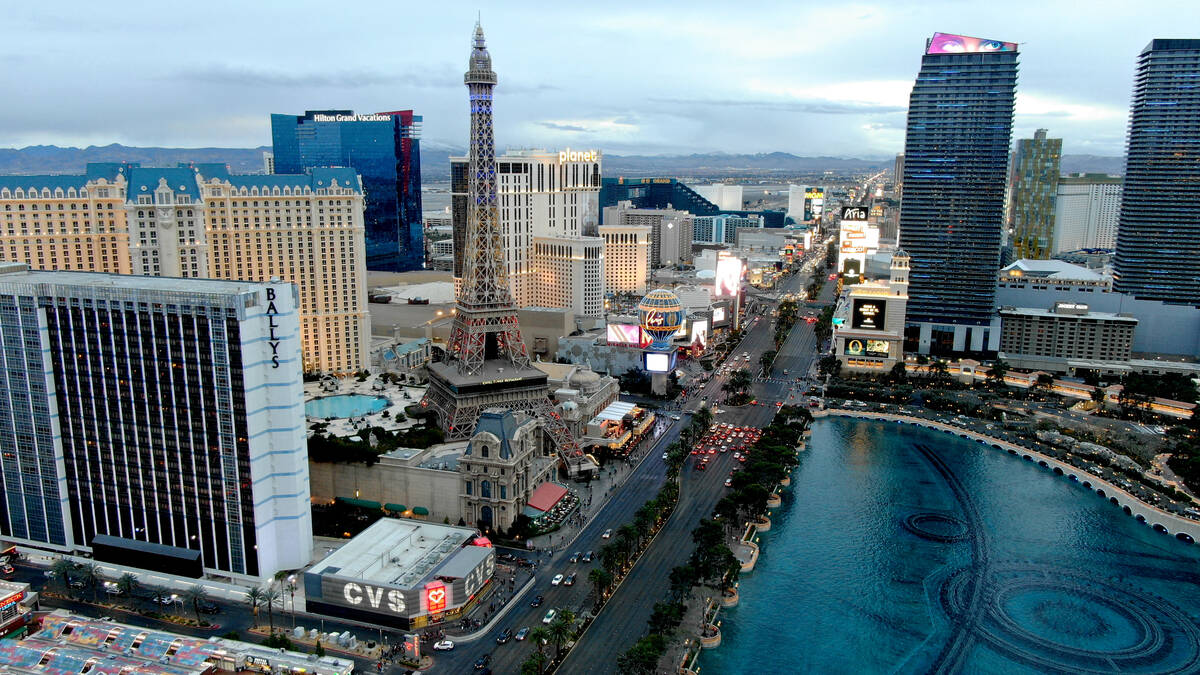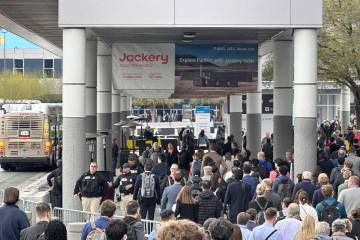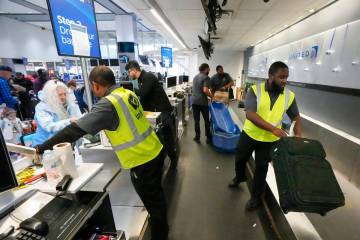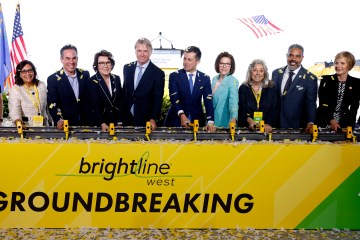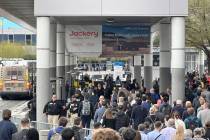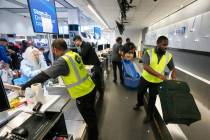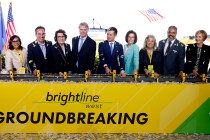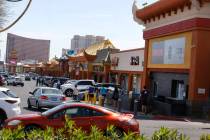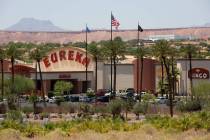Travel industry roaring back to life after pandemic
ATLANTA — Practically every industry in America was impacted by the pandemic, but tourism was among the hardest hit as travel all but evaporated.
The industry has since roared back to life, including in Las Vegas, though it still hasn’t recouped all of the business it lost.
A panel of industry professionals gave their take on hotel sales and development, travel and other issues last week at the National Association of Real Estate Editors conference in Atlanta.
The Review-Journal moderated the discussion with Charlotte Kang, national practice lead for hotels and hospitality at real estate brokerage Jones Lang LaSalle; Michael Ritz, senior vice president of investments at Peachtree Hotel Group; Ben Brunt, chief investment officer at Noble Investment Group; and T.Jack Bagby, principal at architecture and design firm Cooper Carry. This conversation has been edited for length and clarity.
Review-Journal: The first thing I want to talk about is the pandemic’s impact on travel, tourism, conventions and the hotel real estate market. Take us back to those scary days in spring 2020 when basically the economy shut off and travel stopped.
Brunt: We had a portfolio of roughly 50 assets when the pandemic started; we went to 2 (percent) to 5 percent occupancy across our portfolio in April of ’20. It’s kind of a blur to look back on that period of time. We were all looking for the traveling nurses, government-related demand, anything that would generate revenue for our hotels. Most of our assets had 35 to 50 employees, each hotel went down to a skeleton crew of about three to six people. It was a very difficult working environment for all of those folks. The person that was checking you in was likely cleaning your room as well as doing the laundry and doing whatever food prep was out there. (At the corporate level,) we certainly had a lot to manage. You had to modify every single loan; we chose to participate in some PPP loans. So there was a lot of paperwork, loan work, investor calls, you name it.
Charlotte, can you talk about the pipeline of sales and what happened to all the deals that were in the works around the country when the pandemic hit?
Kang: It was a very scary time. Sales that were in negotiation did get delayed, but we did see some sales that were far along enough that took place. But at the time, everybody was trying to understand what’s going on and how does the industry — as owners, lenders and operators — prepare for what might be coming. It was not until later, where there’s vaccine coming to roll out, we saw pockets of areas, especially areas that opened up for travel, where transactions started to take place.
Did you and your team even attempt to do valuations at that time when hotels were closed and nobody was going on vacation?
Kang: We certainly attempted to; our clients were asking us to do that. I was on the phone every day — almost felt like every hour, every half-hour — and our job was trying to get as much consensus as possible from market participants and try to get the information: If you were to buy the property today, what are you willing to pay?
Ritz: Ninety percent of our company became an asset management practice, where we were trying to communicate to all of our lenders, our investors, keep everybody in the know and also be on the receiving side of that. One thing that was a little bit different was the other 10 percent of our team became capital markets, and we raised money. Fears were growing, people were liquidating their positions in the equity markets, trying to harbor cash. No one knew what the future of their investments looked like. Our principals founded the company in 2008 on buying distressed debt and saw an opportunity to potentially buy distressed debt and get into assets at lower valuations. We ended up spending about a billion and a half dollars through 2020 and mid-2021 buying hotels, doing bridge loans, construction loans. Basically while the market was turned off, we were trying to place capital in a dislocated environment.
T.Jack, can you talk about your industry? Did bids disappear for work in hotels, or were you seeing hotel owners looking to change the interior to accommodate what was going on with COVID, like add new HVAC systems?
Bagby: Around April of 2020, I would say that about 60, 65 percent of all of our jobs that were on boards went on hold. There were individuals and family investment groups who were trying to time the market, and some came to us looking to try to start design work. But for the most part, the industry really did dry up.
Last year, record-low mortgage rates fueled a homebuying frenzy across the country. With tourism climbing back in 2021 and cheap money widely available, was there a similar surge in hotel purchases last year?
Brunt: Yes, there was a significant amount of transaction activity starting at the beginning of 2021 through at least the first quarter of ’22. The transaction environment was really fueled by the ability to forecast, and certainly interest rates were at an all-time low, and lenders were eager to get back in the game, so that did spark a lot of transactions.
Can you talk about how the sharp jump in interest rates this year has impacted hotel construction financing or hotel sales?
Kang: For assets that are very good quality, in very good locations, we are still seeing very strong interest from buyers. If you have an asset that is well located with strong fundamentals in a strong economic environment, those are very resilient so far.
Can you also talk about the pipeline of hotel construction that we’re seeing around the country, especially how it compares to the years leading up to the pandemic?
Brunt: What I’ve recently read, and this is through Lodging Econometrics, a New Hampshire-based group that follows new construction, what they’re reporting is construction starts are down 40 percent versus the same period in ’19. Whether it is some combination of interest rates but also a significant piece is inflation and the overall cost to build. When you combine that in a supply chain-challenged environment, it does make it more difficult to build.
Bagby: The supply chain is a portion of it when it comes to construction costs, but it’s also the labor. You’re seeing a significant shortage in skilled tradesmen, such that the ability to schedule subcontractors on jobs is becoming more and more difficult, and so the price of course is going up. Though we may figure out the supply chain issues, I’m not sure that we’re going to figure out the labor issue very quickly.
Kang: Debt financing is also harder to get.
Ritz: And will only get harder.
Why is that?
Ritz: Elevated rates. The Federal Reserve is committed to bringing down inflation, getting the economy to cool down. If they continue to, and they’re successful, then we should see elevated rates. Those rates, as they continue to go up, the cost of capital for debt providers and debt users needs to go up in tandem. We’re getting to a point where the cost of debt is approaching the cost of equity, and then deals don’t pencil. So that’s kind of when you get a spigot that just turns off.
How has the pandemic affected interior hotel layouts or the guts of a hotel?
Bagby: Some of the only lingering effects we’ve seen from COVID are this emphasis on wellness. It started pre-pandemic, but it really hit a boost with the pandemic. This idea of working into the hotel more connection to the outdoors, whether it’s bringing the outdoors in through greenery or more windows, or having physical outdoor space. We’ve seen more outdoor lounge areas, outdoor meeting spaces, trying to also maximize the use of spaces around the hotel, realizing they can monetize those areas.
How is domestic travel doing in the U.S., and how does leisure travel compare to conventions, which at least in Las Vegas took longer to re-emerge from the pandemic.
Ritz: I think a lot of our eyes are on the business traveler. It was such a big piece of our revenue streams prior to COVID. Return-to-office is a huge conversation, but to what extent does business travel really come back? It’s come back a little bit quicker than anybody anticipated, but it’s not necessarily the huge consulting firms that everybody thinks are back on the roads. It’s the smaller, hungry, new startup businesses — it’s two people on the road, not eight, but there might be six groups of them going to compete for that business and get in front of one of their potential new clients and have a face-to-face interaction.
Contact Eli Segall at esegall@reviewjournal.com or 702-383-0342. Follow @eli_segall on Twitter.



